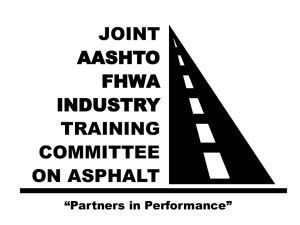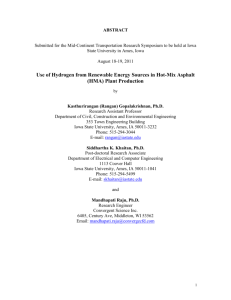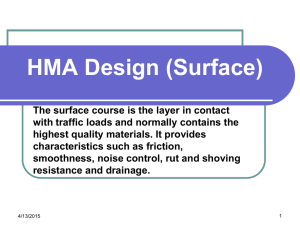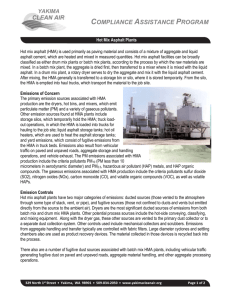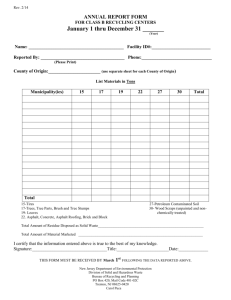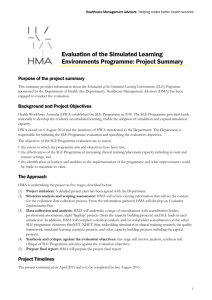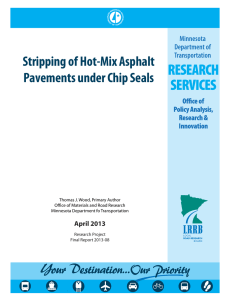Research Project Statement 17-30 FY 2017 Annual Program
advertisement
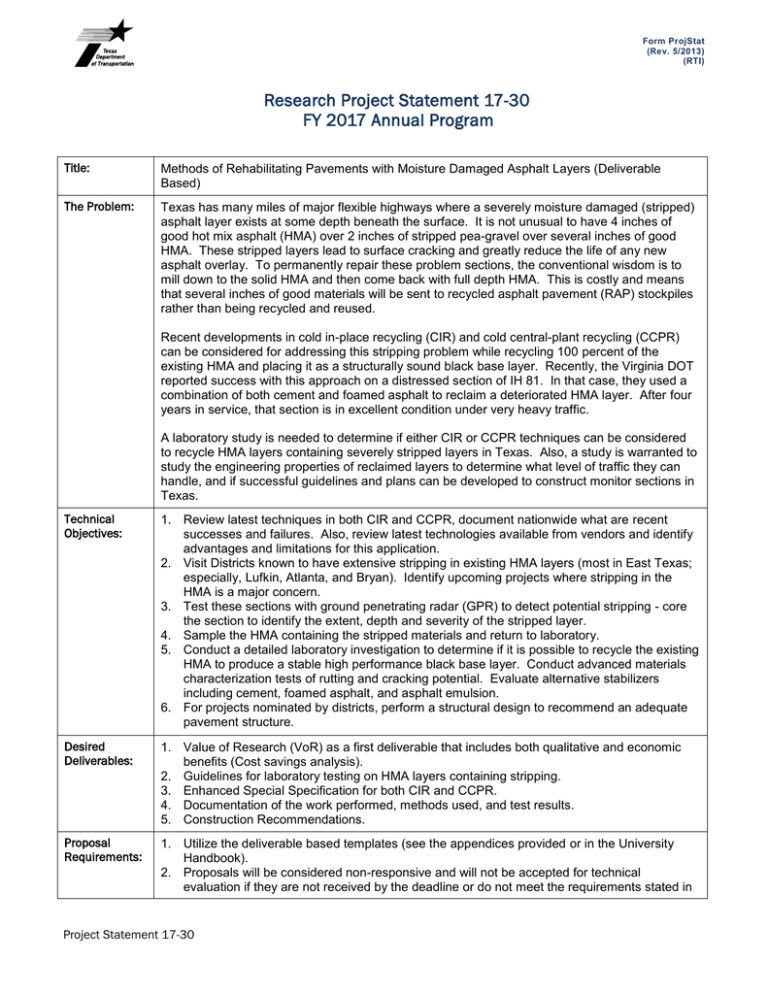
Form ProjStat (Rev. 5/2013) (RTI) Research Project Statement 17-30 FY 2017 Annual Program Title: Methods of Rehabilitating Pavements with Moisture Damaged Asphalt Layers (Deliverable Based) The Problem: Texas has many miles of major flexible highways where a severely moisture damaged (stripped) asphalt layer exists at some depth beneath the surface. It is not unusual to have 4 inches of good hot mix asphalt (HMA) over 2 inches of stripped pea-gravel over several inches of good HMA. These stripped layers lead to surface cracking and greatly reduce the life of any new asphalt overlay. To permanently repair these problem sections, the conventional wisdom is to mill down to the solid HMA and then come back with full depth HMA. This is costly and means that several inches of good materials will be sent to recycled asphalt pavement (RAP) stockpiles rather than being recycled and reused. Recent developments in cold in-place recycling (CIR) and cold central-plant recycling (CCPR) can be considered for addressing this stripping problem while recycling 100 percent of the existing HMA and placing it as a structurally sound black base layer. Recently, the Virginia DOT reported success with this approach on a distressed section of IH 81. In that case, they used a combination of both cement and foamed asphalt to reclaim a deteriorated HMA layer. After four years in service, that section is in excellent condition under very heavy traffic. A laboratory study is needed to determine if either CIR or CCPR techniques can be considered to recycle HMA layers containing severely stripped layers in Texas. Also, a study is warranted to study the engineering properties of reclaimed layers to determine what level of traffic they can handle, and if successful guidelines and plans can be developed to construct monitor sections in Texas. Technical Objectives: 1. Review latest techniques in both CIR and CCPR, document nationwide what are recent successes and failures. Also, review latest technologies available from vendors and identify advantages and limitations for this application. 2. Visit Districts known to have extensive stripping in existing HMA layers (most in East Texas; especially, Lufkin, Atlanta, and Bryan). Identify upcoming projects where stripping in the HMA is a major concern. 3. Test these sections with ground penetrating radar (GPR) to detect potential stripping - core the section to identify the extent, depth and severity of the stripped layer. 4. Sample the HMA containing the stripped materials and return to laboratory. 5. Conduct a detailed laboratory investigation to determine if it is possible to recycle the existing HMA to produce a stable high performance black base layer. Conduct advanced materials characterization tests of rutting and cracking potential. Evaluate alternative stabilizers including cement, foamed asphalt, and asphalt emulsion. 6. For projects nominated by districts, perform a structural design to recommend an adequate pavement structure. Desired Deliverables: 1. Value of Research (VoR) as a first deliverable that includes both qualitative and economic benefits (Cost savings analysis). 2. Guidelines for laboratory testing on HMA layers containing stripping. 3. Enhanced Special Specification for both CIR and CCPR. 4. Documentation of the work performed, methods used, and test results. 5. Construction Recommendations. Proposal Requirements: 1. Utilize the deliverable based templates (see the appendices provided or in the University Handbook). 2. Proposals will be considered non-responsive and will not be accepted for technical evaluation if they are not received by the deadline or do not meet the requirements stated in Project Statement 17-30 Form ProjStat (Rev. 5/2013) (RTI) RTI’s University Handbook. 3. Proposals should be submitted in PDF format, 1 PDF file per proposal. File name should include project name and university abbreviation. Pre-Proposal Meeting Information: Wednesday, March 23, 2016 9:00 – 9:45AM Austin Riverside Campus 118 E. Riverside Dr. RTI Conference Room, 1st Floor Webex Information: 1. Go to https://txdot.webex.com/mw0401lsp13/mywebex/default.do?siteurl=txdot&rnd=0.9091095085622 569 2. Meeting Number: 735 915 144 3. If requested, enter your name and email address. 4. If a password is required, enter the meeting password: FY17 5. Click "Join". Teleconference Information: Provide your phone number when you join the meeting to receive a call back. Alternatively, you can call: Call-in toll-free number: 1-866-637-1408 (US) Conference Code: 951 211 7290 Notifying RTI of Intent to Propose: Notify your University Liaison of your intent to submit a proposal. Your Liaison will provide information regarding the RFP. Proposal Deadline: Proposals are due to RTI by 4:00 P.M. Central Daylight Time, April 14, 2016. Email submissions should be sent to rtimain@txdot.gov. Project Statement 17-30
